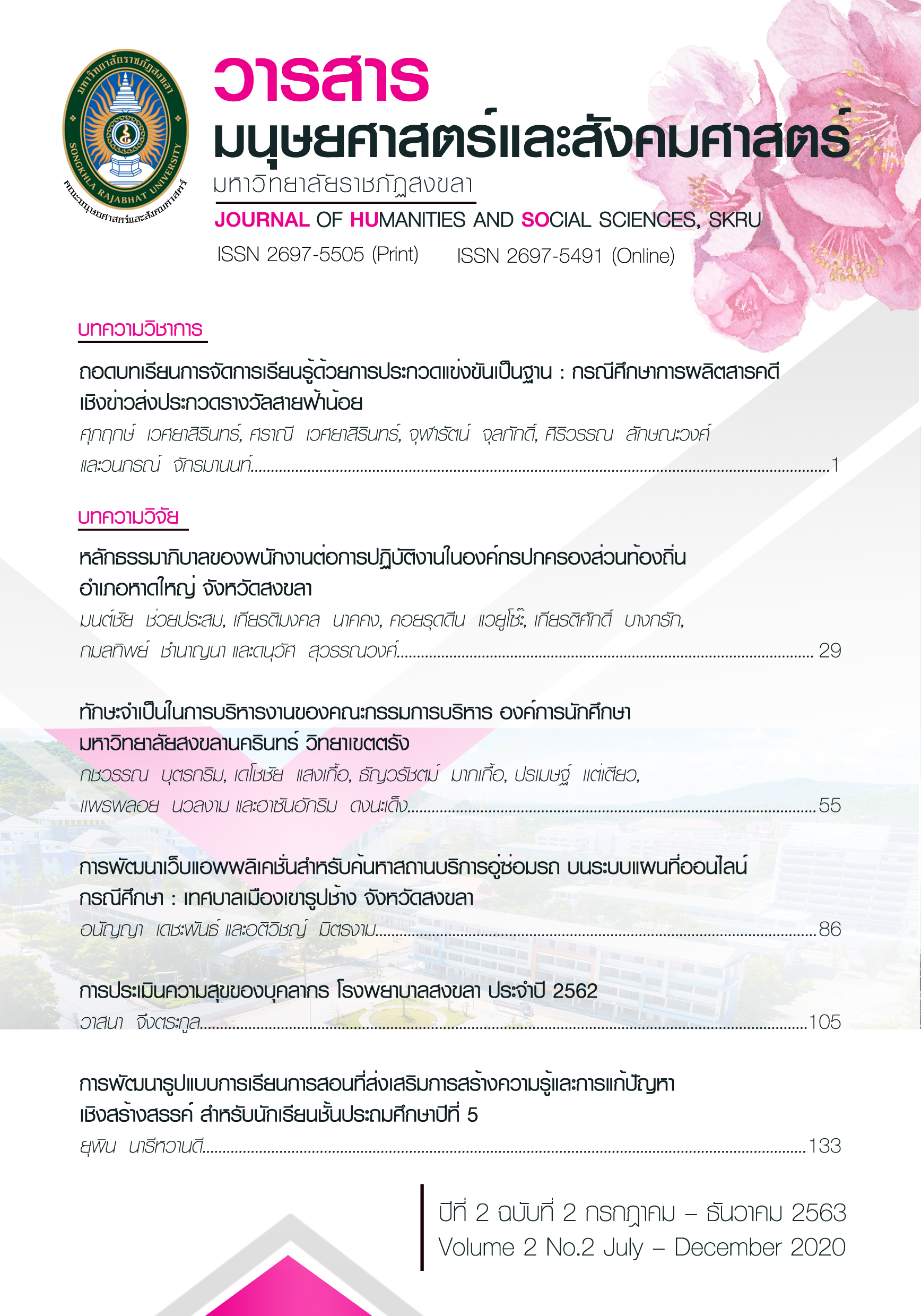GOOD GOVERNANCE OF EMPLOYEES TOWARDS THE OPERATIONS IN LOCAL GOVERNMENTS OF HAT YAI DISTRICT, SONGKHLA PROVINCE
Main Article Content
Abstract
The purposes of this research were to study the level of opinions of the employees on the performance of good governance in the local government organization and to study the problems and obstacles in the operation according to good governance of the employees. The sample consisted of 400 employees from local administrative organizations. Data were analyzed using statistics of Mean, Standard Deviation and Content analysis. The results found that, overall, the opinions of the employees on the performance of good governance of the local government organization in Hat Yai District, Songkhla province was at the highest level ( = 4.31). When considering each item, it was found that it was in the highest level of 5 aspects, in order from highest to lowest, namely moral principles ( = 4.47), responsibility principles ( = 4.41), transparency principles ( = 4.33), principles of participation ( = 4.25), the rule of law ( = 4.23) and the aspect at a high level was the value principle ( = 4.18) respectively. The opinions of the employees regarding the problems and obstacles in the operation according to the principles of good governance found that the majority agreed that it was a matter of lack of motivation in the work, people do not understand the law as a whole, lack of participation of the people, corruption, the patronage system and injustice that still occur within the local government organization.
Downloads
Article Details
ลิขสิทธิ
References
Corruption Perception Index-CPI. (2562). อันดับความโปร่งใสไทยปี ค.ศ. 2018. สืบค้นเมื่อวันที่ 16 กันยายน 2562, จาก https://www.bbc.com/thai/thailand.
Nation. (2562). เนชั่นวิเคราะห์เลือกตั้ง 2562. สืบค้นเมื่อวันที่ 19 กันยายน 2562, จาก https://www.nationtv.tv/main/content.
กมลลักษณ์ ธนานันต์เมธี. (2559). อิทธิพลของธรรมาภิบาลและวัฒนธรรมองค์การที่ส่งผลต่อประสิทธิผลองค์การขององค์การบริหารส่วนตำบล ในเขตภาคเหนือของประเทศไทย. วิทยานิพนธ์ระดับปริญญาเอก. หลักสูตรปรัชญาดุษฎีบัณฑิต (สาขาการบริหารการพัฒนาองค์การ). มหาวิทยาลัยเจ้าพระยา. นครสวรรค์.
เกษม วัฒนชัย. (2546). ธรรมาภิบาลกับบทบาทของคณะกรรมการสถานศึกษาขั้นพื้นฐาน. กรุงเทพฯ: สำนักนโยบายและแผนการศึกษา สำนักงานคณะกรรมการการศึกษาแห่งชาติ.
ชัยวัฒน์ สถาอานันท์. (2549). อาวุธมีชีวิต? : แนวคิดเชิงวิพากษ์ว่าด้วยความรุนแรง. กรุงเทพฯ: ฟ้าเดียวกัน.
ไชยวัฒน์ ค้ำชู. (2545). ธรรมาภิบาล. กรุงเทพฯ: น้ำฝน.
ณัฐ วิมลพีรพัฒนา. (2556) แนวทางการนำหลักธรรมาภิบาลมาใช้ในการบริหารงานองค์กรกระบวนการยุติธรรม: ศึกษากรณีกรมสอบสวนคดีพิเศษ. วิทยานิพนธ์ระดับปริญญาโท. หลักสูตรศิลปศาสตรมหาบัณฑิต. มหาวิทยาลัยมหิดล. นครปฐม.
ธนกฤต โพธิ์เงิน. (2557). “ปัจจัยด้านการบริหารจัดการตามหลักธรรมาภิบาลที่มีผลต่อประสิทธิผลการบริหารงานขององค์การบริหารส่วนตำบลในเขตจังหวัดปทุมธานี” วารสารวิชาการมหาวิทยาลัยปทุมธานี. 6(2). 320-328.
เรณู หมื่นห่อ. (2554). ปัจจัยที่มีอิทธิพลต่อผลสัมฤทธิ์ในการนำหลักธรรมา ภิบาลไปปฏิบัติในองค์การบริหารส่วนจังหวัดภูเก็ต. วิทยานิพนธ์ระดับปริญญาโท. สาขาวิชารัฐประศาสนศาสตรมหาบัณฑิต.มหาวิทยาลัยสุโขทัยธรรมาธิราช. นนทบุรี.
ลาชิต ไชยอนงค์. (2556). ธรรมาภิบาล วัฒนธรรมองค์การ กับประสิทธิผลองค์การของศาลยุติธรรม: ตัวแบบสมการโครงการ. วิทยานิพนธ์ระดับปริญญาเอก. หลักสูตรรัฐประศาสนศาสตรดุษฎีบัณฑิต.มหาวิทยาลัยเกริก. กรุงเทพฯ.
สุรเชษฐ์ คะสุดใจ. (2553). ความสัมพันธ์ระหว่างธรรมาภิบาลกับประสิทธิผลขององค์การบริหารส่วนตำบล ในเขตจังหวัดนครพนม. วิทยานิพนธ์ระดับปริญญาโท. หลักสูตรรัฐประศาสนศาสตรมหาบัณฑิต.มหาวิทยาลัยราชภัฏอุบลราชธานี. อุบลราชธานี.


